shouldhavedone的用法
could、should、would+have_done
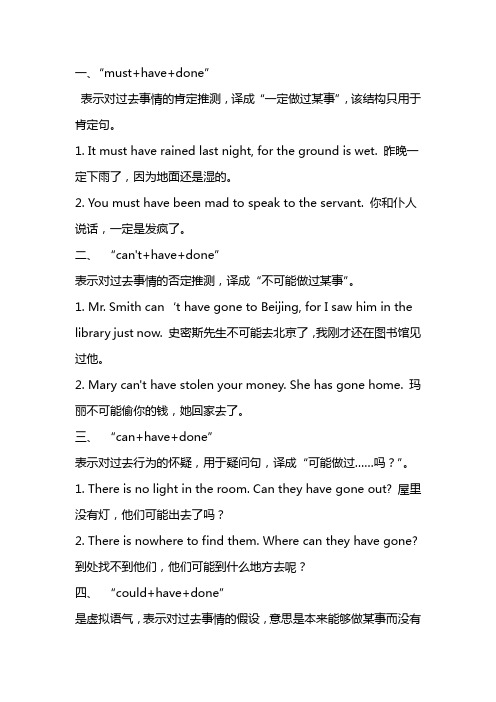
一、“must+have+done”表示对过去事情的肯定推测,译成“一定做过某事”,该结构只用于肯定句。
1. It must have rained last night, for the ground is wet. 昨晚一定下雨了,因为地面还是湿的。
2. You must have been mad to speak to the servant. 你和仆人说话,一定是发疯了。
二、“can't+have+done”表示对过去事情的否定推测,译成“不可能做过某事”。
1. Mr. Smith can‘t have gone to Beijing, for I saw him in the library just now. 史密斯先生不可能去北京了,我刚才还在图书馆见过他。
2. Mary can't have stolen your money. She has gone home. 玛丽不可能偷你的钱,她回家去了。
三、“can+have+done”表示对过去行为的怀疑,用于疑问句,译成“可能做过……吗?”。
1. There is no light in the room. Can they have gone out? 屋里没有灯,他们可能出去了吗?2. There is nowhere to find them. Where can they have gone? 到处找不到他们,他们可能到什么地方去呢?四、“could+have+done”是虚拟语气,表示对过去事情的假设,意思是本来能够做某事而没有He could have passed the exam, but he was too careless. 本来他能够通过考试,但是他太粗心。
五、“may+have+done”表示对发生过的事情的推测,意思是“可能已经”或“也许已经”,用于肯定句中。
—What has happened to George?—I don't know. He may have got lost.—乔治发生了什么事?——我不知道,他可能迷路了。
shouldn't have done的用法

shouldn't have done的用法在英语中,shouldn't have done是一个常见的短语,意思是“本不应该做某事”。
这个短语通常用来表示后悔或责备,因为它表明某人做了一件事情,但现在认为这是错误的或不应该发生的。
在本文中,我们将探讨shouldn't have done的用法,并且提供一些例子来帮助你更好地理解它的含义和用法。
一、shouldn't have done的基本用法shouldn't have done的基本用法是表示过去某个时间点或某个事件发生之后,认为自己或他人不应该做某事。
这个短语通常用在口语和书面语中,特别是在对自己或他人的行为进行评价或反思时。
下面是一些例句:1. I shouldn't have eaten so much cake at the party last night. Now I feel sick.昨晚在派对上我不应该吃那么多蛋糕。
现在我感觉很难受。
2. He shouldn't have talked to his boss like that. It was very disrespectful.他不应该那样和他的老板说话。
那很不尊重。
3. We shouldn't have gone to that movie. It was a waste of time.我们不应该去看那个电影。
那是浪费时间。
4. She shouldn't have trusted him. He has a history of lying.她不应该相信他。
他有撒谎的历史。
二、shouldn't have done的否定形式shouldn't have done的否定形式是should have done,意思是“应该做某事”。
这个短语通常用来表示反对或批评某人没有做某事,而这样做可能会导致更好的结果。
should-have-done-的用法

should have done 的用法1.should用于表示惊奇和欣喜的句子中,表示“竟然”、“居然”等含义1)。
Why should the door be locked?为什么居然把门锁起来了?2). It is wonderful that you should have achieved so much in these years. 这几年中你们竟然取得如此大的成就,真了不起!(注意这里主语从句内出现时间状语in these years,一般要求用现在完成时,而使用should是为了表示惊异、赞叹意味。
2。
should have done 表示竟然做了某事,体现说话者一种惊奇、惊讶、不相信的语气:The painting considered to have been copied should have won the prize.那副被认为是复制品的画竟然获得了大奖。
3。
should have done 还可以表示“本来应该做某事而实际上没有做”You should have finished your homework earlier,but you didn’t。
注意:should have done只用于谈论过去情况,主要有两个用法:一是用于推测过去已经发生的情况,二是用于指本该发生而实际上未发生的情况。
如:You should have told me so before。
你早就应该告诉我。
He should have arrived by now. 此时他本该到了.Look at the time!We should have been at the theatre ten minutes ago。
瞧都什么时候了!十分钟前我们就该到戏院了.附:有关should的用法:一、作shall的过去式,多用于间接引语中,表示“提议、探询、许诺、要求、命令、决定、必要”等。
1. She asked me if she should open the window。
情态动词+have-done用法

情态动词+h a v e-d o n e用法(总2页)--本页仅作为文档封面,使用时请直接删除即可----内页可以根据需求调整合适字体及大小--情态动词+have done (have been doing )一、教学目标情态动词+have done (have been doing ) 的用法二、生成问题情态动词+have done (have been doing ) 的用法有哪些1、should(ought to)+have done (have been doing )表示“本来应该做而实际上没做”,其否定式表示“本来不该做却做了”,常含有责备的语气。
You should have been here five minutes ago.五分钟之前你就应该到这里了。
How I regretted the days when I had played and should have studied.我多么懊悔我本应该好好学习的日子都玩掉了。
We shouldn’t have been resting so long.我们真不该休息这么长时间。
2、could+have done表示“本来有能力做而实际上没有做”。
—We could have walked to the station, it was so near.这么近,我们完全能走着来车站。
—Yes. A taxi was not at all necessary.是呀,根本不必搭车的。
I could have won if I hadn’t fallen over.要不是摔倒,我准能赢。
3、needn’t+have done表示“本来不必做的事,实际上做过了”。
I got up early, but needn’t have done so, because I had nothing to do that morning.那天早上我起得很早,可我根本不必起这么早,因为我无事可做。
Should have done
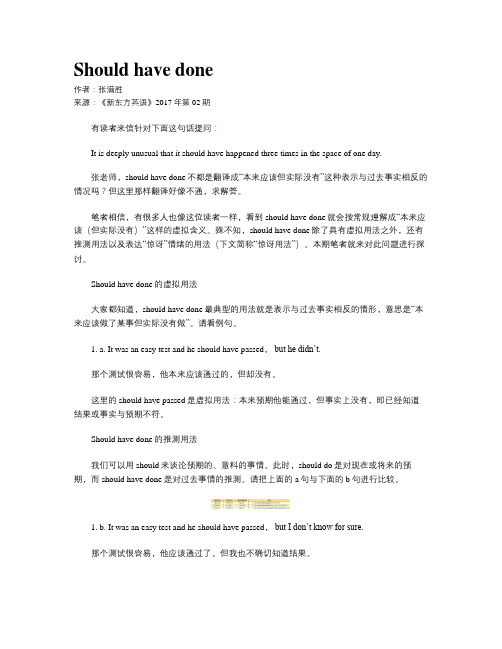
Should have done作者:张满胜来源:《新东方英语》2017年第02期有读者来信针对下面这句话提问:It is deeply unusual that it should have happened three times in the space of one day.张老师,should have done不都是翻译成“本来应该但实际没有”这种表示与过去事实相反的情况吗?但这里那样翻译好像不通,求解答。
笔者相信,有很多人也像这位读者一样,看到should have done就会按常规理解成“本来应该(但实际没有)”这样的虚拟含义。
殊不知,should have done除了具有虚拟用法之外,还有推测用法以及表达“惊讶”情绪的用法(下文简称“惊讶用法”)。
本期笔者就来对此问题进行探讨。
Should have done的虚拟用法大家都知道,should have done最典型的用法就是表示与过去事实相反的情形,意思是“本来应该做了某事但实际没有做”。
请看例句。
1. a. It was an easy test and he should have passed,but he didn’t.那个测试很容易,他本来应该通过的,但却没有。
这里的should have passed是虚拟用法:本来预期他能通过,但事实上没有,即已经知道结果或事实与预期不符。
Should have done的推测用法我们可以用should来谈论预期的、意料的事情。
此时,should do是对现在或将来的预期,而should have done是对过去事情的推测。
请把上面的a句与下面的b句进行比较。
1. b. It was an easy test and he should have passed,but I don’t know for sure.那个测试很容易,他应该通过了,但我也不确切知道结果。
这里是should have done的推测用法。
英语语法考试含答案重点:情态动词+ have done
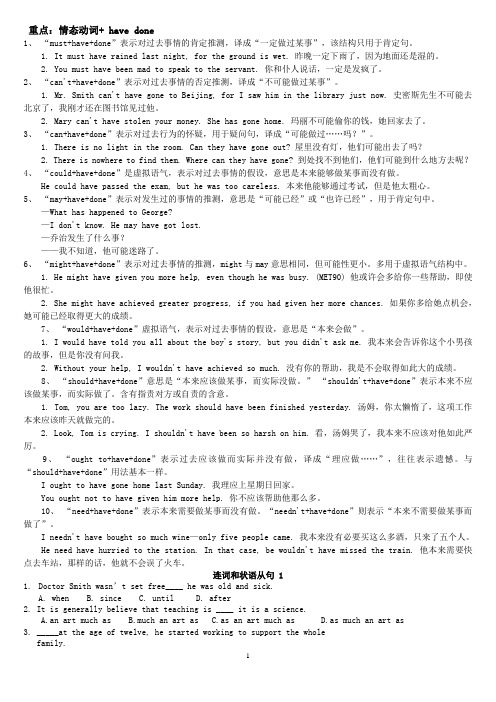
重点:情态动词+ have done1、“must+have+done”表示对过去事情的肯定推测,译成“一定做过某事”,该结构只用于肯定句。
1. It must have rained last night, for the ground is wet. 昨晚一定下雨了,因为地面还是湿的。
2. You must have been mad to speak to the servant. 你和仆人说话,一定是发疯了。
2、“can't+have+done”表示对过去事情的否定推测,译成“不可能做过某事”。
1. Mr. Smith can't have gone to Beijing, for I saw him in the library just now. 史密斯先生不可能去北京了,我刚才还在图书馆见过他。
2. Mary can't have stolen your money. She has gone home. 玛丽不可能偷你的钱,她回家去了。
3、“can+have+done”表示对过去行为的怀疑,用于疑问句,译成“可能做过……吗?”。
1. There is no light in the room. Can they have gone out? 屋里没有灯,他们可能出去了吗?2. There is nowhere to find them. Where can they have gone? 到处找不到他们,他们可能到什么地方去呢?4、“could+have+done”是虚拟语气,表示对过去事情的假设,意思是本来能够做某事而没有做。
He could have passed the exam, but he was too careless. 本来他能够通过考试,但是他太粗心。
5、“may+have+done”表示对发生过的事情的推测,意思是“可能已经”或“也许已经”,用于肯定句中。
高考考点should have done 句型

高考考点should have done 句型
(1)should have done意为“本来该做......而实际没做”,用来表示对已发生事情的不满或责备等语气。
(2)should have done 用在某些从句中时,可表示惊奇,意为“竟然做了某事”。
相关联想:
(1)ought to have done 本来该做某事
(2)could have done 本来能做某事
(3)might have done 本来可以做某事
(4)needn't have done 本来不必做某事
【即景活用】
1.The train left five minutes ago. You a bit earlier
五分钟前火车已出发,你该早一点儿来到。
2.You are right. I ____ that.你说得对,我是该想到那一点的。
3. I you in such bad manners this morning
我上午本不应该以那样不礼貌的方式对待你。
4. I never thought that he that.
我真没想到他竟然会说出那样的话。
5.I can't imagine a person like him such a foolish mistake.
真想不到像他这样的人竟然会犯这么愚蠢的错误。
参考答案:1. should have come 2. should have thought of 3. shouldn't have
treated 4.should have said 5.should have made。
情态动词加have done的用法
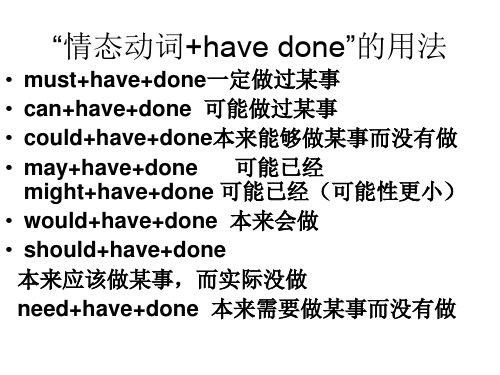
十、 “need+have+done”
• 表示本来需要做某事而没有做。 “needn‘t+have+done”则表示“本来不需要做 某事而做了”。 • I needn„t have bought so much wine—only five people came. 我本来没有必要买这么多酒,只来 了五个人。 • He need have hurried to the station. In that case, be wouldn't have missed the train. 他本来需要快 点去车站,那样的话,他就不会误了火车。
七、 “would+have+done”
• 虚拟语气,表示对过去事情的假设,意思 是“本来会做”。 • 1. I would have told you all about the boy's story, but you didn't ask me. 我本来会告诉 你这个小男孩的故事,但是你没有问我。 • 2. Without your help, I wouldn't have achieved so much. 没有你的帮助,我是不 会取得如此大的成绩。
情态动词havedone的用法canhavedone可能做过某事mayhavedone可能已经mighthavedone可能已经可能性更小wouldhavedone本来会做shouldhavedone本来应该做某事而实际没做needhavedone本来需要做某事而没有做引水枢纽萨兰河倒虹吸古河倒虹吸恰里卡尔水电站和扬水站五座建筑物主体结构基本完好但由于自然老化各战争毁坏结构表面有磨损剥蚀弹坑及麻面有些上部结构破坏严重
一、 “must+have+done”
关于虚拟语气的用法与理解(shouldhavedone)

关于虚拟语⽓的⽤法与理解(shouldhavedone)“should + 完成时”,主要有以下四种⽤法:⼀、“should + 完成时”,表⽰“过去本应该做某事,⽽实际未做”,属于虚拟语⽓的⼀种。
You should have reported them to the police. 你应当向警⽅控告他们的。
The problem should have been ironed out months ago. 这个问题⼏个⽉前就该解决了。
You should have been more careful in money matters. 在钱⽅⾯,你本当更⼩⼼点的。
I'm to blame. I should have thought of that. 都怪我,我应该想到这⼀点。
You should have known better than to talk like that. 你本应更懂事⽽不致说这样的话。
⼆、“should + 完成时”与虚拟条件连⽤,表⽰“与过去事实不符或相反的虚拟语⽓”。
【说明】if 从句⽤过去完成时,主句⽤“should + 完成时”,主句的主语仅限于使⽤第⼀⼈称。
这时,should 可以⽤would 代替。
例如:If I had seen Mary I should/would have invited her. 我当时要是看到玛丽的话我本会邀请她的。
If I had received the present, I should/would have thanked him. 如果我收到了礼物,我是应当向他道谢的。
I should/would not have laughed if I had thought you were serious. 如果我想到你是认真的,我就不会笑了。
也可以⽤其他结构代替if 条件句。
例如:But for your advice, I should/would have failed. 要不是你的忠告,我会失败的。
情态动词should的用法

Practice
1. It was really very dangerous; you ______ him seriously. A. might have injured B. could injure C. should have injured D. must injure
2. — “________ you mind my opening the window?” — “Not at all.” A. Shall B. Should C. Will D. Would
3. I didn’t hear the phone. I ______ asleep. A. must be C. should have B. must have been D. could have bee
4. You _______ pay more attention to your spelling next time. A. would B. should
已是3点钟了,足球比赛开始了。
4. 在疑问句中表示惊讶、不合理、难以置信或不应说的事。 例如: Why should I go? 我干嘛要去?(不满) Why should he publish such a book? 为何他竟会出版这种书? Why should you be sorry about the news? 你为何对这消息感到难过? Should he do such a thing? 他会做这种事吗? How should I know? 我怎么会知道? Who should write it but himself? 不是他自己还有谁会写呢?
但当表示“应该”时,should 更侧重自己主观的看法, 而 且ought to 更着重客观的情况。
通过高考题精讲 should (ought to)have done的用法
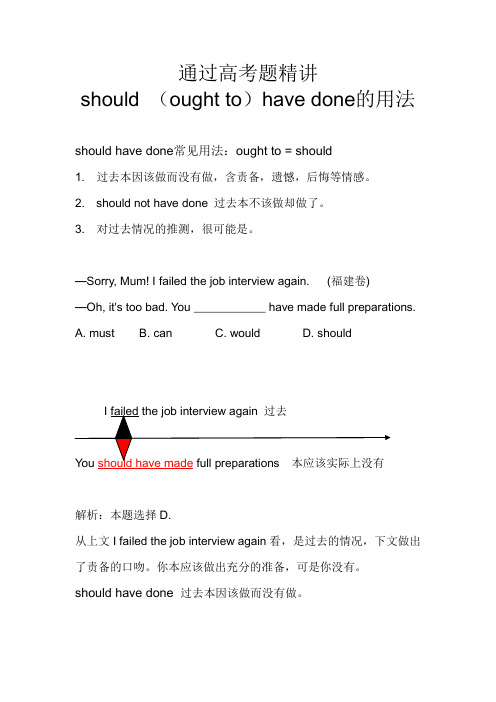
通过高考题精讲should (ought to)have done的用法should have done常见用法:ought to = should1. 过去本因该做而没有做,含责备,遗憾,后悔等情感。
2. should not have done 过去本不该做却做了。
3. 对过去情况的推测,很可能是。
—Sorry, Mum! I failed the job interview again. (福建卷)—Oh, it's too bad. You ___________ have made full preparations.A. mustB. canC. wouldD. shouldYou should have made解析:本题选择D.从上文I failed the job interview again看,是过去的情况,下文做出了责备的口吻。
你本应该做出充分的准备,可是你没有。
should have done过去本因该做而没有做。
(1988)5. We ___________ for her because she never came. (A)needn't wait (B)shouldn't have waited(C)mustn't wait (D)mustn't have waited解析:本题选择B.从下文she never came看,是过去的情况,上文做出了责备或是抱怨的语气。
我们本不应该等,可事实上我们等了。
Should not have done 过去本不该做却做了。
If we had started right now, we should have arrived there by Friday. 如果此刻出发,到周五我们很可能就到了。
(表推测用的较少)(1999上海)14.There was a lot of fun at yesterday’s party. You _______ come, but why didn’t you?A.must haveB. shouldC.need haveD. ought to have解析:本题选择D.从上文There was a lot of fun at yesterday’s party看,是过去的情况,下文You _______ come, but why didn’t you。
情态动词should的用法

1. should do “表现在可将来” should have done “ 表过去”
应 该
与ought to用法相当,但不如 ought to 语气强。 We should learn about the computer and make full use of it. 我们应该了解计算机并加以充分利用。 You should listen to the doctor’s advice. 你应当听大夫的话。 I should have finished my work. 我应该做完我的工作。(实际上还没有做完)
表示与过去事实的相反, 意为 “本应该……”
2. 在It is/was right that...类句型的that从句中,以虚拟语
气表示“应该如此”或“不合理”、“难以置信”、“不 该如此”等意思(事实并非如愿)。例如: It is/was no wonder that he should have succeeded. (表过去) 难怪他会成功。 It is/was a pity that he should have failed. (表过去) 真可惜他失败了。 It is not right that one should speak ill of others. (表现在及未来) 说别人的坏话是不对的。 It is strange that you should say so . (表现在) 你这样说话真奇怪呀!
6. A computer _______ think for itself; it
_______ be told what to do.
A. may not, must
C. shouldn’t, could didn’t.
would have done的用法

would have done, might have done, could have done,should have done分别表示什么意思?2009/12/07 17:52一、在虚拟语气中的用法1. should have done 表示“过去本应该做某事却未做。
”其否定结构 shouldn't have done 表示“过去本不该做某事却做了。
”2. ought to have done 表示“过去本应该做某事却未做。
”其否定结构 oughtn't to have done 表示“过去本不该做某事却做了。
”have to do 表示不得不做,被迫做某事ought to do 与should do 都表示应该做某事,但ought to do 语气更强,常用于长辈对小辈的用语或某规则上的要求(严格的规则应用must ).而 should do 可用语平辈朋友间,较为客气与口语化3. need have done 表示“过去本有必要做某事却未做。
”其否定结构 needn't have done 表示“过去本没必要做某事却做了。
”4. could (不能用 can) have done 表示“过去本能够做某事却未做。
”注意:其否定形式couldn't have done 没有虚拟语气的用法,couldn't have done 只能表推测,相当于 can't have done,意为:“过去不可能做了某事。
”5. might (不能用 may) have done 表示“过去本可以做某事却未做。
” 注意:其否定形式 might not have done 没有虚拟语气的用法,might not have done 只能表推测,相当于 may not have done,意为:“过去可能没有做某事。
”二、表推测的用法1. must have done表示对过去某事的肯定猜测,译为:过去肯定做了某事。
情态动词详解和区分
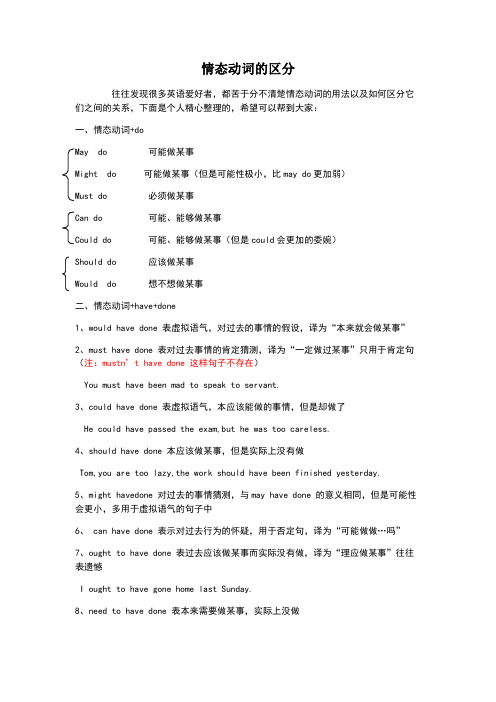
情态动词的区分往往发现很多英语爱好者,都苦于分不清楚情态动词的用法以及如何区分它们之间的关系,下面是个人精心整理的,希望可以帮到大家:一、情态动词+doMay do 可能做某事Might do 可能做某事(但是可能性极小,比may do更加弱)Must do 必须做某事Can do 可能、能够做某事Could do 可能、能够做某事(但是could会更加的委婉)Should do 应该做某事Would do 想不想做某事二、情态动词+have+done1、would have done 表虚拟语气,对过去的事情的假设,译为“本来就会做某事”2、must have done 表对过去事情的肯定猜测,译为“一定做过某事”只用于肯定句(注:mustn’t have done 这样句子不存在)You must have been mad to speak to servant.3、could have done 表虚拟语气,本应该能做的事情,但是却做了He could have passed the exam,but he was too careless.4、should have done 本应该做某事,但是实际上没有做Tom,you are too lazy,the work should have been finished yesterday.5、might havedone 对过去的事情猜测,与may have done 的意义相同,但是可能性会更小,多用于虚拟语气的句子中6、 can have done 表示对过去行为的怀疑,用于否定句,译为“可能做做…吗”7、ought to have done 表过去应该做某事而实际没有做,译为“理应做某事”往往表遗憾I ought to have gone home last Sunday.8、need to have done 表本来需要做某事,实际上没做I need have returned this book to Jack,but I was too busy to give it back to him.9、May have done 表对过去的事情的推测,译为“可能已经”或“也许已经”用于肯定句I don’t know ,he may have gone lost.三、情态动词的否定形式+have +donewouldn’t have done 本来不会做某事would have done 本来会做某事,但是没有做couldn’t have done 不会做某事(不可能做的事情)can have done 不能做某事can/could have done 本来会/能够做某事,实际上没有做should have done 本不应该做某事,但是实际上却做了=ought not to have doneShould have done 本应该做某事,但是实际上未做Needn’t have done 本来不需要做某事,但是却做了Need have done 本来需要做某事,但是没有做Must do 不表示猜测,必须去做某事Must have done 那时….怎样He must be young 他一定很年轻He must have been young 他那时候很年轻。
have done 语法

1. Something may have happened to her.她可能发生了什么事情。
She might have had an accident.她或许遭受了意外.So she must have taken that too.因此,她肯定把它也带走了。
1) 这三句话都用了“情态动词+不定式的完成时”,表示对发生过的事作某种猜测、推测。
(1) must have done 可用来对某件过去的事情作肯定推测,表示“一定已经,想必已经”做过某事,用于肯定的陈述句中。
否定句中用can't have done。
She must have received the parcel, I sent it by registered post.她一定已经收到包裹了,我是用挂号寄的。
(2) may have done, might have done, could have done “可能做过某事”,就语气而言could have done 所表的可能性更小些。
He may / might / could have left by nine.他可能于九点前已离去。
(3) should have done / ought to have done表示“本该做某事”但实际未做。
I should / ought to have left London before nine but I didn't.我本该在九点以前离开伦敦,但是我没有。
(4) shouldn't have done / oughtn't to have done 表示“本不该做事”,但实际上又做了。
He shouldn't / oughtn't to have left London before nine but he did.他本不该在九点前离开伦敦,但是他离开了。
(5) can't / couldn't have done 表否定推测,“不可能做过某事”。
情态动词+have done
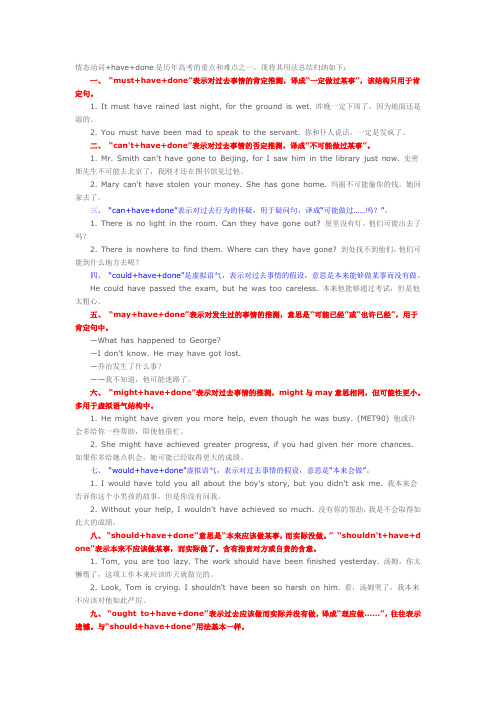
情态动词+have+done是历年高考的重点和难点之一,现将其用法总结归纳如下:一、“must+have+done”表示对过去事情的肯定推测,译成“一定做过某事”,该结构只用于肯定句。
1. It must have rained last night, for the ground is wet. 昨晚一定下雨了,因为地面还是湿的。
2. You must have been mad to speak to the servant. 你和仆人说话,一定是发疯了。
二、“can't+have+done”表示对过去事情的否定推测,译成“不可能做过某事”。
1. Mr. Smith can't have gone to Beijing, for I saw him in the library just now. 史密斯先生不可能去北京了,我刚才还在图书馆见过他。
2. Mary can't have stolen your money. She has gone home. 玛丽不可能偷你的钱,她回家去了。
三、“can+have+done”表示对过去行为的怀疑,用于疑问句,译成“可能做过……吗?”。
1. There is no light in the room. Can they have gone out? 屋里没有灯,他们可能出去了吗?2. There is nowhere to find them. Where can they have gone? 到处找不到他们,他们可能到什么地方去呢?四、“could+have+done”是虚拟语气,表示对过去事情的假设,意思是本来能够做某事而没有做。
He could have passed the exam, but he was too careless. 本来他能够通过考试,但是他太粗心。
五、“may+have+done”表示对发生过的事情的推测,意思是“可能已经”或“也许已经”,用于肯定句中。
情态动词+have_done
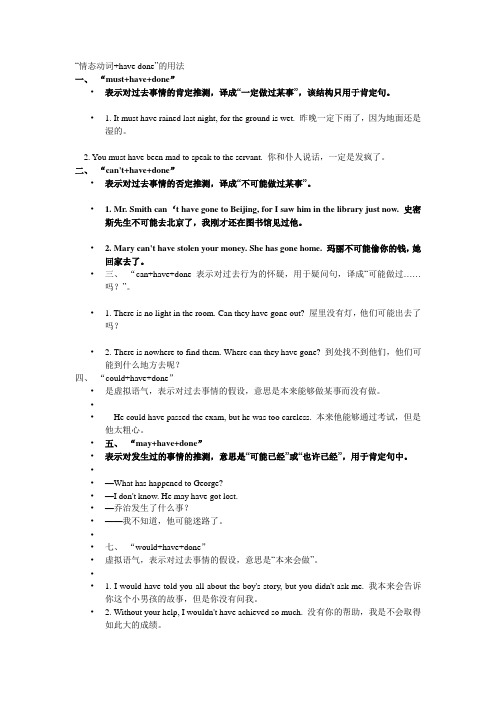
“情态动词+have done”的用法一、“must+have+done”•表示对过去事情的肯定推测,译成“一定做过某事”,该结构只用于肯定句。
• 1. It must have rained last night, for the ground is wet. 昨晚一定下雨了,因为地面还是湿的。
2. You must have been mad to speak to the servant. 你和仆人说话,一定是发疯了。
二、“can't+have+done”•表示对过去事情的否定推测,译成“不可能做过某事”。
• 1. Mr. Smith can‘t have gone to Beijing, for I saw him in the library just now. 史密斯先生不可能去北京了,我刚才还在图书馆见过他。
• 2. Mary can't have stolen your money. She has gone home. 玛丽不可能偷你的钱,她回家去了。
•三、“can+have+done表示对过去行为的怀疑,用于疑问句,译成“可能做过……吗?”。
• 1. There is no light in the room. Can they have gone out? 屋里没有灯,他们可能出去了吗?• 2. There is nowhere to find them. Where can they have gone? 到处找不到他们,他们可能到什么地方去呢?四、“could+have+done”•是虚拟语气,表示对过去事情的假设,意思是本来能够做某事而没有做。
••He could have passed the exam, but he was too careless. 本来他能够通过考试,但是他太粗心。
•五、“may+have+done”•表示对发生过的事情的推测,意思是“可能已经”或“也许已经”,用于肯定句中。
人教版高中英语必修4课件 知识点——should have done“本来应该做(应该没有做)”

能用mustn’t,应该用can’t;should have done本应该做某事(实
际上未做);can’t have done不可能做了某事,根据句意可知, 这里表示否定的推测,故选C.
should have done“本来应该做(应该没有做)”
【典型例题】
3. They _________ have arrived at lunchtime but their flight was delayed. A. will C. must B. can D. should
I should have left London before 9, but I didn’t. 我本该在9点以前
离开伦敦,但是我没有。
should have done“本来应该做(应该没有做)”
【知识点解析】
In my opinion, she should have resigned earlier. 在
我看来,她应当更早一点儿辞职。
You are right; I should have thought of that. 你说 得对,我本应当想到这一点的。 I should have phoned Ed this morning, but I forgot. 今天上午我本该给埃德打电话,但是我忘了。
--You _______ it in the wrong place. A. must put C. might have put 答案:C 解析:句意:—妈妈,我的球在哪里?我昨天把它放在这里 的。—你可能放错地方了。根据句意可知是对过去情况的推测, 所以使用“情态动词+have done”的形式;如果是对现在情况的 B. might put D. should have put
- 1、下载文档前请自行甄别文档内容的完整性,平台不提供额外的编辑、内容补充、找答案等附加服务。
- 2、"仅部分预览"的文档,不可在线预览部分如存在完整性等问题,可反馈申请退款(可完整预览的文档不适用该条件!)。
- 3、如文档侵犯您的权益,请联系客服反馈,我们会尽快为您处理(人工客服工作时间:9:00-18:30)。
should have done 的用法
用于表示惊奇和欣喜的句子中,表示“竟然”、“居然”等含义
1). Why should the door be locked为什么居然把门锁起来了
2). It is wonderful that you should have achieved so much in these years. 这几年中你们竟然取得如此大的成就,真了不起!(注意这里主语从句内出现时间状语in these years,一般要求用现在完成时,而使用should是为了表示惊异、赞叹意味。
have done 表示竟然做了某事,体现说话者一种惊奇、惊讶、不相信的语气:
The painting considered to have been copied should have won the prize.
那副被认为是复制品的画竟然获得了大奖。
have done 还可以表示“本来应该做某事而实际上没有做”
You should have finished your homework earlier, but you didn't。
注意:
should have done只用于谈论过去情况,主要有两个用法:一是用于推测过去已经发生的情况,二是用于指本该发生而实际上未发生的情况。
如:
You should have told me so before. 你早就应该告诉我。
He should have arrived by now. 此时他本该到了。
Look at the time! We should have been at the theatre ten minutes ago. 瞧都什么时候了! 十分钟前我们就该到戏院了。
附:有关should的用法:
一、作shall的过去式,多用于间接引语中,表示“提议、探询、许诺、要求、命令、决定、必要”等。
1. She asked me if she should open the window.
2. She said she should buy me a dictionary.
3. Should I type these letters for you(提议、探询)
二、用于虚拟语气中,作虚拟语气的标志词。
1. We should never have built the bridge without your help.(与过去相反)
2. If it should rain tomorrow, I wouldn’t go out.(与将来相反)
3. She insisted that we (should) stay.
4. His order is that we (should) do that at once.
三、表示“推断”,作“可能、应该、会是”等。
me know if you should hear some more news
2. I told Sally to fix him up with his job, but perhaps I should have written it out for her.
3. I felt sure that we should meet again.
4. The effect of tax should be felt in higher prices.
四、表示“应该、应当”,比must预期稍弱,同义词为ought to。
1. Everyone should know some first aid.
2. You shouldn’t move if you are badly hurt.
3. Elder brothers should take care of their younger brothers and sisters.
五、表示客气和委婉的语气。
1. I would be very grateful if you should let me know about it.
2. I should say that you have done much to me.
六、表示“责备”或“后悔”。
1. I was really anxious about you. You shouldn’t have left home without a word.(责备)
2. I shouldn’t have said such a thing.(后悔)
七、表示“吃惊”,作“居然、竟然、不以为然”讲。
1. Why should any object to her enjoying herself
2. I can’t think why he should have been so angry.
3. When I was going out of the store, who should I meet but my former classmate!
4. How should I know
八、用于一些固定结构中。
1. I should…如果我是你, 我就会……
2. I should like…我想……(做某事)
3. I should have thought…我还以为……(表示惊奇)
4. I should think…. 我看(想)……。
